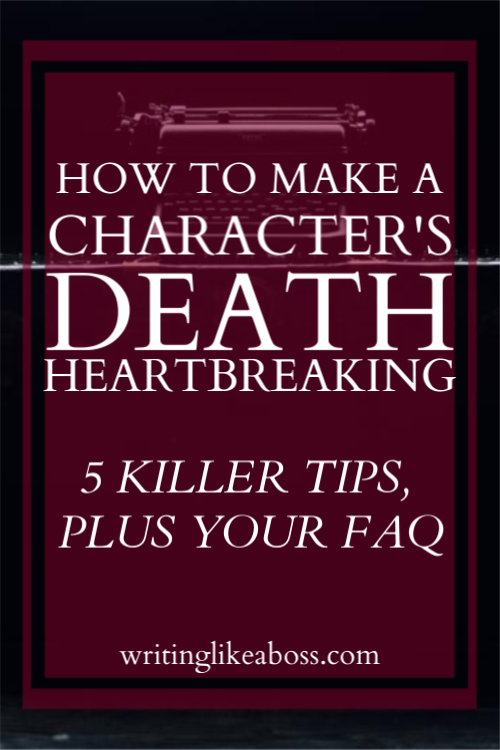The original version of this post is my most popular by far, and let me just say: you writers are cruel.
This is the rewritten and elaborated edition. Check out the original here!
For a while, I was pretty notorious for killing off characters.
The book I self-published when I was thirteen, spoiler alert, kills off the main character’s best friend. My family talked about it for months after reading it.
Oh, and a manuscript I wrote a couple years later depicts my pov character killing her love interest to protect her friend. I had been emailing that story, chapter by chapter, to a friend of mine, and her reaction was pretty much what you’d expect.
Clearly, I had a thing for dark themes.
Though I killed off a lot of characters back then, I wasn’t careless: it was all intentional. Those deaths moved the plot forward, as any character death should, and had been placed strategically.
But what were those strategies? How did I kill off characters so meaningfully, it hurt the reader while still advancing the plot?
That’s what I’m here to share today!
HOW TO MAKE A CHARACTER’S DEATH *HEARTBREAKING*

1. ESTABLISH A BOND
If you kill off a character before the reader can establish a bond, then play it off as though they had established a bond, it reads forced and unnecessary.
It doesn’t matter how well you utilize the other tips in this post. If the reader doesn’t have some sort of bond with that character, the death will just be null and void to them.
Good rule of thumb: the longer the reader has known the character before his death, the better. This is why most character deaths are closer to the end of the book.
Which leads me right to our next point:
2. CAUSE OF DEATH
This brings me back to my own story. My pov character went head over heels for this guy. But, her best friend had wronged him. When the love interest threatened the best friend, my pov character made a choice that was ultimately the death of her guy, but saved her friend.
That instances is, as you can tell, much more tragic than natural cause. It moved the plot forward, showed the bond between my pov character and her best friend, and well as expressed a darker side of the pov character.
However, your character doesn’t have to be killed by someone close to them for the death to be heart-wrenching.
Another simple tactic: play to your reader’s own experience.
For example: a character dying of age, or losing a battle to cancer, are both common themes that your reader is likely to have experienced in their own life. That’s why so many books and films feature a dog dying: nearly everyone has lost a pet, so this unknowingly triggers memories of that experience.
3. CHARACTER REACTION
In most cases, it isn’t the death itself that gets you: it’s the reaction from the other characters.
I could put so many examples here, because it’s such a well-utilized tactic. Here are a couple of those examples:
Spider-Man – let’s face it, it wasn’t Uncle Ben’s death that hurt you: it was Peter Parker’s reaction.
Also The Hunger Games – I didn’t terribly care that Prim had died; till it call came crashing down on Katniss and she took it out on Prim’s cat.
It isn’t a difficult trick; actually, most writers will use it instinctively. But it’s good to keep in the back of your mind.
4. FIGHTING DEATH … OR NOT?
Just imagine it: your character is fighting in the battle, and he’s doing well; until he’s taken off guard by a stronger enemy. He tries to fight back, screaming for help that doesn’t come.
Having your character fight back against what’s trying to kill him is a crude way to make your readers feel sadder, without them fully realizing it. But there’s an even more heartbreaking strategy I’m going to explain here: your character knows he’s going to die, and doesn’t fight it.
Maybe he’s fatally ill, but doesn’t want to concern his family by bringing it up until it’s too late. Maybe he’s welcoming death like an old friend. Maybe he just knows it’s no use, he can’t save himself, so why bother trying?
So many heartbreaking possibilities here.
5. GIVE HIM SOMETHING TO LIVE FOR
Every character needs goals. There are no exceptions. If he has a valid reason to keep fighting, the reader can connect with him more – these are the basics of character building.
If you want your character to die a fulfilling and complete death, be sure that he’s accomplished his main goal first.
BUT if you feel the need to totally break your reader’s heart (which you probably do, if you clicked this article), let that goal go unfinished. Cruel, isn’t it?
BONUS: AVOIDING NEEDLESS DEATHS
Minor spoiler alerts for the Fantastic Beasts series ahead.
Very little irritates me more than killing characters off just for the heck of it. Character deaths shouldn’t be taken lightly, even in genres with high death-counts (e.g. fantasy and science fiction).
A lot of fiction will show off the power of a villain by having him kill off characters left and right, so when the protagonists must face him, the reader is legitimately concerned for the protagonists’ life. This is a great strategy.
However!
There is a line. Once you cross it, the deaths just seem unnecessary and depressing. There’s no point in depressing your reader, folks.
Allow me to share a quick example: J.K. Rowling’s Fantastic Beasts movies.
I saw The Crimes of Grindelwald shortly after it came out, and honestly? The movie itself wasn’t terrible, but the needlessly high death count ruined it for me. You’d have to pay me to see it again.
I understood what the writers were doing: they were showing off the power of their villain, i.e. killing off pretty much anything that blinks at him. Again, a great tactic.
But they crossed that line. They featured death just for the sake of death. Don’t be like Fantastic Beasts. Make your character deaths’ count, writer.
FAQ
How do I know when to kill off a character?
It’s all about context, of course, so there’s no hard and fast “rule.” But consider these points:
- If you need to advance the plot, you can kill off a character.
- If you need to motivate another character, you can kill off a character.
- If you need emotional impact to tie into the plot, you can kill off a character.
- If you need to kill off a character for historical accuracy, you can kill him off.
- If you’re bored with your story, you can kill off a character, but consider how you’ll make it more relevant in your revisions.
- If your character isn’t pulling his weight in the story, do not kill him off. Either give him a bigger role, or omit him entirely.
- If you’re killing off a character for the sake of it, do not kill him off.
Can I kill off my main character?
Again, it’s all about context. Killing off your main character is kind of a gray area: a lot of people do not recommend it, but lately, books featuring the protagonist’s death are on the rise.
Personally, I don’t have a problem with the main character dying. But if you’re going to do it, do it right.
The best way for a main character to die is nobly: maybe to save a friend, or fighting for what they believe in. Remember that your reader has spent a whole book getting to know him. Don’t give the character a tasteless death, or your reader may feel cheated.
Do you have anything to add? Questions or points to make? Please share!
Be sure to check out my Instagram, Twitter, Facebook, and Pinterest for more writing tips. Happy writing!


Comments
6 responses to “How to Make a Character’s Death Heartbreaking (2019 edition)”
Wow, this was exactly what I needed at exactly the right time! In your opinion, is it more significant to have the character who’s about to die tell the main character something , or have the main character find it out for themselves after the death? I know it can be good in either case, but I was wondering if you had any points for either one. Thanks! 😉
Hey, Aynsley! Great question!
Personally, I think either works well. It just depends on the story. Or you could mix the two! You could have the dying character start to tell the main character something, but they can’t manage to say everything, so the main character has to figure out the rest for himself. I hope that helps!
Thanks, I’ll look into that more! Can’t wait for another post!!!
In a book I read the guy admits his love to the girl and then a few pages later he dies. Would you recomend doing something like that?
Hey Maisey! Great question. So long as it was well-written and advanced the plot well, I personally think that’s a pretty solid strategy for writing a tragic death. It’s definitely heartbreaking. 😉
[…] How to Make a Character’s Death Heartbreaking (2019 edition) […]